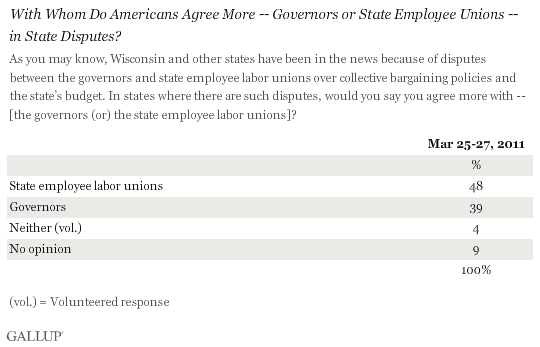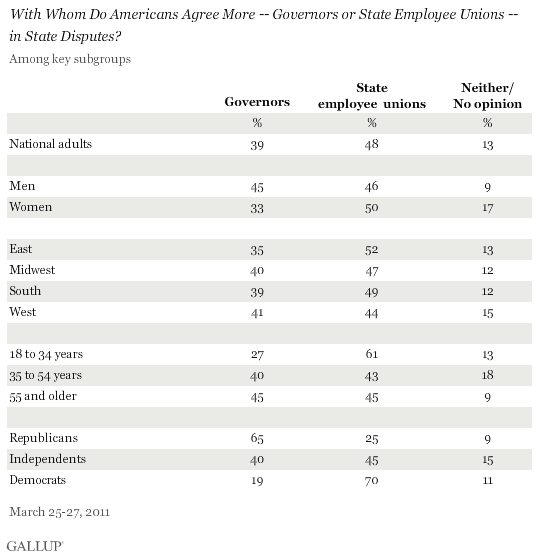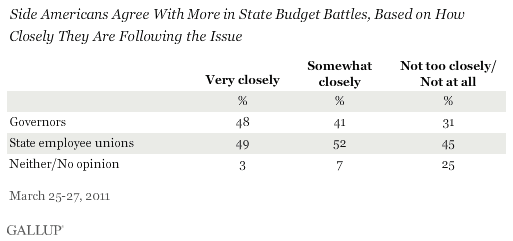PRINCETON, NJ -- With political battles over state budgets and collective bargaining still playing out to varying degrees in Wisconsin, Ohio, Indiana, Maine, and several other states, 48% of Americans say they agree more with the unions in these disputes, while 39% agree more with the governors. Thirteen percent favor neither side or have no opinion.

Significant budget shortfalls have compelled several Republican governors this year to take on state employee unions over collective bargaining or pay and benefits, or both. Unions in many states have pushed back, arguing they are being unfairly scapegoated, and taking their cases to their legislatures and to the public through massive protests. The March 25-27 Gallup poll was conducted after the Wisconsin legislature passed a budget bill that included new restrictions on collective bargaining, but while that bill's legality was still under court review.
A few subgroups of Americans show particularly broad support for unions in these battles. Democrats give unions their highest support, at 70%, followed by young adults -- those aged 18 to 34 -- at 61%. A majority of residents in the East, 52%, favor unions, the only region to cross the 50% support threshold.
Similar percentages of men and women take the unions' side (46% and 50%, respectively); however, women are significantly less likely than men to favor the governors (33% vs. 45%) and significantly more likely to have no opinion.
Only Republicans show solid majority support for the governors, at 65%, while several other groups -- men, middle-aged and older Americans, and independents -- are about evenly divided.

Union Workers Are Largely United Against Governors
Wisconsin has become a rallying point for labor unions across the country. Some union workers have traveled to Wisconsin to join that state's protests, while others are invoking what they see as the injustices occurring in Wisconsin in their own local battles.
According to the new Gallup poll, 68% of Americans who are themselves union members say they favor the unions in these disputes, while 24% favor the governors. Extensive support for unions, 64%, is also found among the broader group of respondents who say they or someone in their household belongs to a union.
By contrast, adults living in nonunion households are more evenly split in their preferences, with 45% siding with the unions and 40% with the governors.
Six in 10 Paying Close Attention
The new poll finds 28% of Americans following the news about these budget and union matters very closely and 32% somewhat closely. The combined 60% following it closely represents average U.S. public attention to a major news story, according to Gallup's measurement of more than 200 news events since 1991.
Attention to the matter is significantly higher among members of union households than among nonunion households, 76% vs. 58%.
Those paying very close attention break evenly in their preferences for governors vs. unions, 48% vs. 49%, respectively. However, those following it somewhat closely or not closely side more with the unions.

Bottom Line
Previous Gallup research about the issues involved in these debates revealed some ambivalence among Americans toward the labor unions' positions. While Americans polled in February were generally opposed to reducing state workers' pay, benefits, and collective bargaining rights, they were even more widely opposed to raising taxes. Also, Americans were evenly divided over whether government unions are more helpful or harmful to states.
Today, neither the governors nor the unions appear to have a strong advantage in the court of public opinion nationally, but the unions do have the slight edge, 48% to 39%. This may be in keeping with decades of Gallup polling finding Americans generally approving of labor unions.
Survey Methods
Results for this Gallup poll are based on telephone interviews conducted March 25-27, 2011, with a random sample of 1,027 adults, aged 18 and older, living in the continental U.S., selected using random-digit-dial sampling.
For results based on the total sample of national adults, one can say with 95% confidence that the maximum margin of sampling error is ±4 percentage points.
Interviews are conducted with respondents on landline telephones (for respondents with a landline telephone) and cellular phones (for respondents who are cell phone-only). Each sample includes a minimum quota of 150 cell phone-only respondents and 850 landline respondents, with additional minimum quotas among landline respondents for gender within region. Landline respondents are chosen at random within each household on the basis of which member had the most recent birthday.
Samples are weighted by gender, age, race, education, region, and phone lines. Demographic weighting targets are based on the March 2010 Current Population Survey figures for the aged 18 and older non-institutionalized population living in continental U.S. telephone households. All reported margins of sampling error include the computed design effects for weighting and sample design.
In addition to sampling error, question wording and practical difficulties in conducting surveys can introduce error or bias into the findings of public opinion polls.
View methodology, full question results, and trend data.
For more details on Gallup's polling methodology, visit www.gallup.com.
